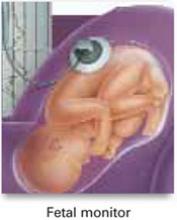User login
<court>Dade County (Fla) Circuit Court</court>
Labor induction was scheduled for a gravida with gestational diabetes due to concerns of macrosomia. Once induced, however, labor progressed slowly.
When fetal monitoring revealed no fetal heart rate, the nurse suspected a problem with the monitor. After adjusting the monitor, she discovered the antisurge box had been removed, and left the room to get another.
Once the monitor was again operating properly, a fetal heart rate was still not detected. An emergency cesarean was ordered, but the child was born with severe cerebral palsy.
The plaintiffs sued the physician and hospital, arguing that the nurse should have notified the doctor immediately upon discovering no fetal heart rate. The delay caused by her attempt to fix the monitor, they argued, led to the child’s injury.
The defense claimed that the mother’s uncontrolled gestational diabetes played a role in the child’s injury, and argued that an intrauterine infection may also have contributed to the outcome.
- The parties settled for $4 million.
The cases in this column are selected by the editors of OBG Management from Medical Malpractice Verdicts, Settlements & Experts, with permission of the editor, Lewis Laska, of Nashville, Tenn (www.verdictslaska.com). While there are instances when the available information is incomplete, these cases represent the types of clinical situations that typically result in litigation.
<court>Dade County (Fla) Circuit Court</court>
Labor induction was scheduled for a gravida with gestational diabetes due to concerns of macrosomia. Once induced, however, labor progressed slowly.
When fetal monitoring revealed no fetal heart rate, the nurse suspected a problem with the monitor. After adjusting the monitor, she discovered the antisurge box had been removed, and left the room to get another.
Once the monitor was again operating properly, a fetal heart rate was still not detected. An emergency cesarean was ordered, but the child was born with severe cerebral palsy.
The plaintiffs sued the physician and hospital, arguing that the nurse should have notified the doctor immediately upon discovering no fetal heart rate. The delay caused by her attempt to fix the monitor, they argued, led to the child’s injury.
The defense claimed that the mother’s uncontrolled gestational diabetes played a role in the child’s injury, and argued that an intrauterine infection may also have contributed to the outcome.
- The parties settled for $4 million.
The cases in this column are selected by the editors of OBG Management from Medical Malpractice Verdicts, Settlements & Experts, with permission of the editor, Lewis Laska, of Nashville, Tenn (www.verdictslaska.com). While there are instances when the available information is incomplete, these cases represent the types of clinical situations that typically result in litigation.
<court>Dade County (Fla) Circuit Court</court>
Labor induction was scheduled for a gravida with gestational diabetes due to concerns of macrosomia. Once induced, however, labor progressed slowly.
When fetal monitoring revealed no fetal heart rate, the nurse suspected a problem with the monitor. After adjusting the monitor, she discovered the antisurge box had been removed, and left the room to get another.
Once the monitor was again operating properly, a fetal heart rate was still not detected. An emergency cesarean was ordered, but the child was born with severe cerebral palsy.
The plaintiffs sued the physician and hospital, arguing that the nurse should have notified the doctor immediately upon discovering no fetal heart rate. The delay caused by her attempt to fix the monitor, they argued, led to the child’s injury.
The defense claimed that the mother’s uncontrolled gestational diabetes played a role in the child’s injury, and argued that an intrauterine infection may also have contributed to the outcome.
- The parties settled for $4 million.
The cases in this column are selected by the editors of OBG Management from Medical Malpractice Verdicts, Settlements & Experts, with permission of the editor, Lewis Laska, of Nashville, Tenn (www.verdictslaska.com). While there are instances when the available information is incomplete, these cases represent the types of clinical situations that typically result in litigation.
